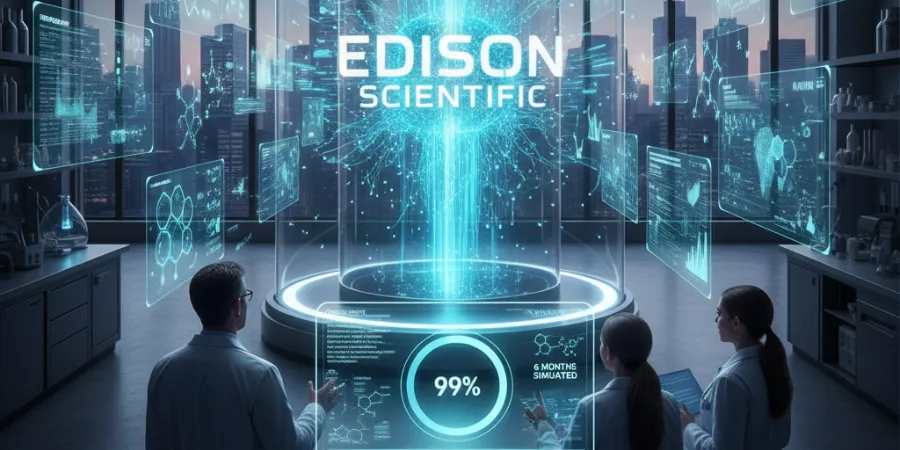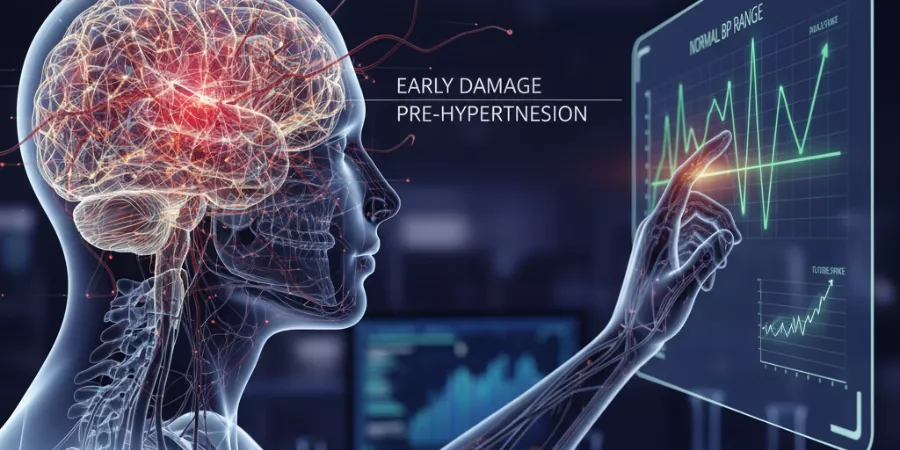FutureHouse, the nonprofit AI research laboratory backed by former Google CEO Eric Schmidt, has launched Edison Scientific as a commercial spinout to address explosive pharmaceutical industry demand for its breakthrough AI research capabilities. The November announcement coincides with the debut of Kosmos, an AI scientist that reportedly compresses six months of human research work into a single day while maintaining nearly 80 percent accuracy across diverse scientific domains.
OpenAI’s Altman Signals Transformative Potential
OpenAI CEO Sam Altman endorsed the development on November 16, characterizing it as “exciting” and predicting Edison Scientific would deliver “one of the most important impacts of AI.” Altman’s public backing carries significant weight given OpenAI’s position at the forefront of AI commercialization and his track record identifying breakthrough applications. The endorsement suggests Kosmos represents more than incremental improvement it may fundamentally reshape how scientific research is conducted, funded, and accelerated.
Kosmos Technical Architecture: Structured World Models
Kosmos achieves its extraordinary throughput through “structured world models,” a novel approach that enables the AI to maintain analytical coherence while processing information volumes that would overwhelm traditional systems. A typical research run involves analyzing approximately 1,500 peer-reviewed scientific papers and executing over 42,000 lines of analysis code a workload requiring months of human effort even for experienced research teams.
The system represents a quantum leap beyond its predecessor, Robin, which FutureHouse deployed earlier in 2025. While Robin demonstrated proof-of-concept for AI-assisted scientific discovery, Kosmos introduces the computational infrastructure and reasoning capabilities required for production-scale pharmaceutical research. The architecture’s ability to synthesize insights across disparate papers while tracking analytical provenance addresses critical limitations of earlier generative AI approaches that struggled with scientific rigor and citation accuracy.
Pharmaceutical Industry Drives Commercial Spinout
FutureHouse co-founders Sam Rodriques and Andrew White announced they were “inundated with requests” from major pharmaceutical companies following their initial platform launch in May 2025. The overwhelming industry interest created a strategic inflection point: continuing to serve commercial demand within the nonprofit structure would divert philanthropic resources toward product development, customer support, and payment infrastructure.
“Building out product features, payment systems, and customer support is not the right use of our philanthropic funding,” the founders stated in announcing Edison Scientific’s formation. The spinout structure enables FutureHouse to maintain its research mission while Edison Scientific addresses market demand with appropriate commercial resources and incentives.
Pricing Strategy Balances Access and Sustainability Edison Scientific will offer a “generous free tier” for academic researchers while charging $200 per research run for power users and enterprise clients. This hybrid model mirrors successful strategies from computational biology platforms like AlphaFold, which democratized protein structure prediction while enabling commercial applications. The $200 price point appears calibrated to deliver pharmaceutical companies substantial cost savings even complex runs represent a fraction of traditional research expenses while generating revenue to sustain platform development.
Validation Through Reproduction and Novel Discovery
Kosmos has demonstrated its capabilities across two critical dimensions: reproducing existing findings and generating novel insights. During testing, the system independently replicated three previously unpublished scientific discoveries, including metabolic pathway alterations in hypothermic mouse brains and materials science breakthroughs in perovskite solar cell performance optimization. This reproduction capability validates Kosmos’s analytical rigor and pattern recognition across diverse scientific domains.
More significantly, Kosmos generated four novel scientific hypotheses that passed expert evaluation:
Cardiovascular Research Breakthrough The system proposed a mechanistic link between the antioxidant enzyme SOD2 and reduced cardiac fibrosis, potentially opening new therapeutic avenues for heart disease treatment.
Diabetes Risk Mechanism Kosmos identified a molecular pathway through which a specific genetic variant may confer protection against Type 2 diabetes, offering targets for drug development.
Cross-Domain Pattern Recognition Additional discoveries spanning neuroscience, genetics, and aging research demonstrated Kosmos’s ability to identify non-obvious connections across traditionally siloed scientific specialties.
The 80 percent accuracy rate across seven validated discoveries establishes Kosmos as substantially more reliable than speculative AI systems while acknowledging the irreducible uncertainty inherent in cutting-edge research. Several findings are currently undergoing wet lab validation with academic partners, with results expected to provide further calibration of the system’s predictive accuracy.
The Six-Month Claim: Methodology and Limitations
Edison Scientific’s assertion that Kosmos completes six months of human research in one day stems from beta user feedback and objective analysis of computational throughput. The metric considers papers read, analytical steps performed, and hypothesis generation activities typically requiring research teams months to accomplish. The founders acknowledged the claim “surprised even them,” suggesting Kosmos exceeded internal performance projections.
However, Edison Scientific explicitly cautions that Kosmos can pursue “statistically interesting but scientifically irrelevant patterns,” requiring human oversight to filter signal from noise. Certain research projects may require multiple runs with refined parameters, adding time and cost. The platform should be understood as dramatically accelerating research workflows rather than eliminating human expertise a distinction critical for appropriate deployment.
Transparency Architecture: Traceable Conclusions
Addressing reproducibility concerns that plague both traditional research and AI-generated insights, every Kosmos conclusion can be traced to specific code lines or scientific passages. This provenance tracking enables peer review of AI-generated hypotheses and ensures that subsequent researchers can verify analytical steps a fundamental requirement for scientific validity.
The transparency architecture positions Kosmos as complementary to human researchers rather than a replacement. Scientists can interrogate the AI’s reasoning, identify analytical gaps, and refine research directions based on machine-generated insights. This collaborative model may prove more transformative than autonomous AI research, combining computational throughput with human intuition and domain expertise.
Industry Implications: Accelerating Drug Discovery
For pharmaceutical companies facing $2.6 billion average drug development costs and decade-long timelines, Kosmos represents potential paradigm shift economics. If the platform can reliably accelerate target identification, mechanism elucidation, and hypothesis generation, it could compress early-stage research phases that currently consume years and hundreds of millions in R&D spending.
The technology arrives as pharmaceutical giants increasingly compete on AI capabilities. Companies from Pfizer to Novartis have launched major AI initiatives, but most focus on narrow applications like molecule design or clinical trial optimization. Edison Scientific offers end-to-end research acceleration across discovery domains, potentially providing competitive advantage to early adopters.
Biotech startups may benefit disproportionately. Resource-constrained companies that previously couldn’t afford large research teams could leverage Kosmos to punch above their weight, potentially democratizing early-stage drug discovery. The $200 per run pricing makes sophisticated AI capabilities accessible to well-funded startups while remaining affordable for academic collaborators seeking commercial partnerships.
Strategic Questions and Future Development
Several strategic uncertainties will shape Edison Scientific’s trajectory:
Intellectual Property Considerations Who owns discoveries made primarily by AI? As Kosmos generates patentable insights, IP frameworks will need clarification to incentivize both platform development and scientific research.
Regulatory Acceptance Will regulatory agencies like the FDA accept AI-generated research as equivalent to human-conducted studies? Early precedents will influence platform adoption and scientific community acceptance.
Competitive Dynamics Google DeepMind, Anthropic, and other well-funded AI labs are pursuing scientific discovery applications. Edison Scientific’s first-mover advantage may compress as competitors deploy comparable capabilities.
The coming months will reveal whether Kosmos represents a temporary capability lead or sustainable competitive moat based on structured world model architecture and scientific domain expertise. For pharmaceutical executives evaluating AI research platforms, Edison Scientific offers immediate productivity gains with the understanding that this technology category will evolve rapidly as competition intensifies and capabilities mature.
The spinout structure itself may become a model for other nonprofit AI labs seeking to commercialize breakthrough capabilities while preserving research missions a governance innovation potentially as significant as the underlying technology.





